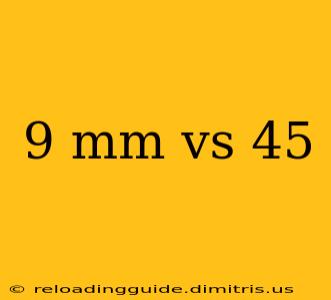The age-old debate: 9mm vs .45 ACP. Both are popular handgun calibers, each with its staunch supporters and detractors. This in-depth comparison will help you understand the key differences and determine which caliber best suits your individual needs and shooting style. We'll explore ballistics, stopping power, capacity, recoil, and cost to provide a comprehensive overview.
Ballistics: A Deep Dive into the Numbers
Understanding the ballistics of each cartridge is crucial. This includes factors like muzzle velocity, energy, and bullet weight. While specific numbers vary depending on the ammunition manufacturer and load, we can look at general averages:
-
9mm: Typically boasts higher muzzle velocity (around 1100-1200 fps) and a flatter trajectory than the .45 ACP. This translates to greater accuracy at longer ranges for many shooters. Common bullet weights range from 115 to 147 grains.
-
.45 ACP: Generally possesses lower muzzle velocity (around 850-1000 fps) and a more pronounced bullet drop. However, it delivers significantly more energy due to its heavier bullet weight (typically 230 grains).
Table Summarizing Ballistic Differences (Approximate Values)
| Caliber | Muzzle Velocity (fps) | Muzzle Energy (ft-lbs) | Bullet Weight (grains) |
|---|---|---|---|
| 9mm | 1150 | 350 | 124 |
| .45 ACP | 850 | 350-400 | 230 |
Stopping Power: The Myth and the Reality
The idea of "stopping power" is often debated fiercely among firearms enthusiasts. While the .45 ACP's larger diameter and heavier bullet might intuitively suggest superior stopping power, the reality is more nuanced. Stopping power is influenced by many factors including shot placement, bullet expansion, and the target's physiology. Both calibers, with proper shot placement, are capable of stopping a threat. Modern 9mm ammunition, particularly jacketed hollow points (JHPs), offers excellent expansion and penetration, often performing similarly to .45 ACP rounds in real-world scenarios.
Capacity: Rounds in the Magazine
A significant advantage of the 9mm is its higher magazine capacity. Most 9mm handguns hold significantly more rounds than .45 ACP handguns of comparable size. This increased capacity offers a tactical advantage in self-defense situations where multiple shots may be necessary.
Recoil: Managing the Kick
The .45 ACP generally exhibits more recoil than the 9mm. This can be a significant factor for new shooters or those with smaller builds. The reduced recoil of the 9mm allows for faster follow-up shots and improved accuracy during rapid fire.
Cost: Ammunition Expenses
Generally, 9mm ammunition is less expensive than .45 ACP ammunition. This can be a considerable factor over time, particularly for those who engage in frequent practice.
Conclusion: The Best Caliber Depends on Your Needs
The "best" caliber—9mm or .45 ACP—ultimately depends on your individual priorities and intended use.
-
Choose 9mm if: You prioritize higher capacity, lower recoil, flatter trajectory, and lower cost of ammunition.
-
Choose .45 ACP if: You prioritize felt recoil (some shooters prefer it), and larger bullet diameter, although the ballistic advantages might be less than some claim.
Ultimately, the most important factor is responsible gun ownership, proper training, and consistent practice with whichever caliber you choose. Consider renting or borrowing both to experience the differences firsthand before making a purchase. Remember to consult with experienced shooters and professionals to further refine your understanding.

